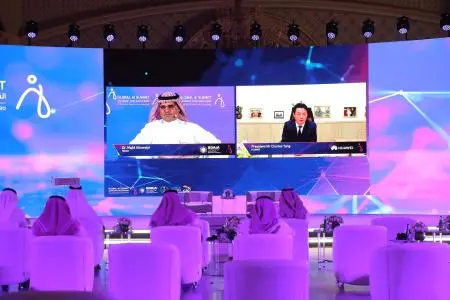PHOTO
Riyadh: Saudi Arabia’s National Center for Artificial Intelligence (NCAI) today announced a Memorandum of Understanding (MoU) with Huawei to enable strategic cooperation on the Kingdom’s National AI Capability Development Program.
Under the MoU, Huawei will support the NCAI to train Saudi AI engineers and students, and to address Arabic language AI-related capabilities. NCAI and Huawei will also explore the creation of an AI Capability Platform to localize technology solutions.
The MoU was announced by Dr. Majid Altuwaijri, CEO of the National Center for Artificial Intelligence (NCAI) at the Saudi Data & Artificial Intelligence Authority (SDAIA), and Charles Yang, President of Huawei Middle East, during the Global AI Summit 2020.
The partnership will aim to create a comprehensive strategy, including an AI capability landscape, that will develop AI skills and capabilities in line with the aims of Vision 2030.
NCAI and Huawei will also explore the National AI Talent cultivation and onboarding program, which will provide professional training in AI to Saudi university students, AI researchers and developers, to enable them to master AI technologies and tools. This ongoing program is intended to create a supply of qualified AI talent to meet growing demand from public and private sector organizations in Saudi Arabia.
The MoU is in line with the NCAI goal to support Saudi Arabia’s National Strategy for Data and AI (NSDAI) and to increase national AI innovation and capabilities.
Dr. Majid Altuwaijri said: “We welcome this partnership with Huawei which seeks to transform the Saudi workforce so that it can utilize the power of data and AI. This will be done through education, upskilling and reskilling of Saudis to create a steady supply of data and AI-empowered talent for the country’s workforce.
“This initiative will play an important role in supporting the Kingdom in achieving its Vision 2030 goals, of which around 70% are directly impacted by the data and AI agenda; and in supporting the national ambition to make Saudi Arabia a world leader in the field of AI.”
Charles Yang, President of Huawei Middle East, commented: “Huawei has adopted an ambitious long-term research and development strategy regarding AI, creating unprecedented opportunities through the synergy of AI with 5G connectivity, cloud, computing, and industry applications. In cooperation with SDAIA, we look forward to creating new value across these tech domains, collaborating with local AI developer and industry partners to transform the Kingdom into a leading data-driven economy.”
The NCAI is an arm of the Saudi Data and Artificial Intelligence Authority (SDAIA), with responsibility for driving the national AI strategy execution, AI innovation and capabilities building.
-Ends-
© Press Release 2020
Disclaimer: The contents of this press release was provided from an external third party provider. This website is not responsible for, and does not control, such external content. This content is provided on an “as is” and “as available” basis and has not been edited in any way. Neither this website nor our affiliates guarantee the accuracy of or endorse the views or opinions expressed in this press release.
The press release is provided for informational purposes only. The content does not provide tax, legal or investment advice or opinion regarding the suitability, value or profitability of any particular security, portfolio or investment strategy. Neither this website nor our affiliates shall be liable for any errors or inaccuracies in the content, or for any actions taken by you in reliance thereon. You expressly agree that your use of the information within this article is at your sole risk.
To the fullest extent permitted by applicable law, this website, its parent company, its subsidiaries, its affiliates and the respective shareholders, directors, officers, employees, agents, advertisers, content providers and licensors will not be liable (jointly or severally) to you for any direct, indirect, consequential, special, incidental, punitive or exemplary damages, including without limitation, lost profits, lost savings and lost revenues, whether in negligence, tort, contract or any other theory of liability, even if the parties have been advised of the possibility or could have foreseen any such damages.




















